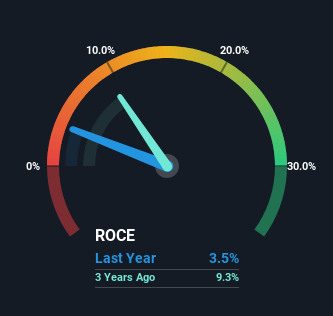There Are Reasons To Feel Uneasy About MaltaPost's (MTSE:MTP) Returns On Capital

To find a multi-bagger stock, what are the underlying trends we should look for in a business? Amongst other things, we'll want to see two things; firstly, a growing return on capital employed (ROCE) and secondly, an expansion in the company's amount of capital employed. Put simply, these types of businesses are compounding machines, meaning they are continually reinvesting their earnings at ever-higher rates of return. However, after briefly looking over the numbers, we don't think MaltaPost (MTSE:MTP) has the makings of a multi-bagger going forward, but let's have a look at why that may be.
Understanding Return On Capital Employed (ROCE)
For those who don't know, ROCE is a measure of a company's yearly pre-tax profit (its return), relative to the capital employed in the business. Analysts use this formula to calculate it for MaltaPost:
Return on Capital Employed = Earnings Before Interest and Tax (EBIT) ÷ (Total Assets - Current Liabilities)
0.035 = €1.1m ÷ (€50m - €18m) (Based on the trailing twelve months to March 2023).
Thus, MaltaPost has an ROCE of 3.5%. In absolute terms, that's a low return and it also under-performs the Logistics industry average of 15%.
View our latest analysis for MaltaPost

Historical performance is a great place to start when researching a stock so above you can see the gauge for MaltaPost's ROCE against it's prior returns. If you'd like to look at how MaltaPost has performed in the past in other metrics, you can view this free graph of past earnings, revenue and cash flow.
What Can We Tell From MaltaPost's ROCE Trend?
On the surface, the trend of ROCE at MaltaPost doesn't inspire confidence. Over the last five years, returns on capital have decreased to 3.5% from 9.5% five years ago. However it looks like MaltaPost might be reinvesting for long term growth because while capital employed has increased, the company's sales haven't changed much in the last 12 months. It's worth keeping an eye on the company's earnings from here on to see if these investments do end up contributing to the bottom line.
On a related note, MaltaPost has decreased its current liabilities to 37% of total assets. That could partly explain why the ROCE has dropped. What's more, this can reduce some aspects of risk to the business because now the company's suppliers or short-term creditors are funding less of its operations. Since the business is basically funding more of its operations with it's own money, you could argue this has made the business less efficient at generating ROCE.
What We Can Learn From MaltaPost's ROCE
Bringing it all together, while we're somewhat encouraged by MaltaPost's reinvestment in its own business, we're aware that returns are shrinking. Since the stock has declined 38% over the last five years, investors may not be too optimistic on this trend improving either. Therefore based on the analysis done in this article, we don't think MaltaPost has the makings of a multi-bagger.
If you'd like to know more about MaltaPost, we've spotted 5 warning signs, and 3 of them can't be ignored.
If you want to search for solid companies with great earnings, check out this free list of companies with good balance sheets and impressive returns on equity.
New: Manage All Your Stock Portfolios in One Place
We've created the ultimate portfolio companion for stock investors, and it's free.
• Connect an unlimited number of Portfolios and see your total in one currency
• Be alerted to new Warning Signs or Risks via email or mobile
• Track the Fair Value of your stocks
Have feedback on this article? Concerned about the content? Get in touch with us directly. Alternatively, email editorial-team (at) simplywallst.com.
This article by Simply Wall St is general in nature. We provide commentary based on historical data and analyst forecasts only using an unbiased methodology and our articles are not intended to be financial advice. It does not constitute a recommendation to buy or sell any stock, and does not take account of your objectives, or your financial situation. We aim to bring you long-term focused analysis driven by fundamental data. Note that our analysis may not factor in the latest price-sensitive company announcements or qualitative material. Simply Wall St has no position in any stocks mentioned.
About MTSE:MTP
MaltaPost
Provides postal and financial services in Malta and internationally.
Flawless balance sheet with solid track record.
Market Insights
Community Narratives



